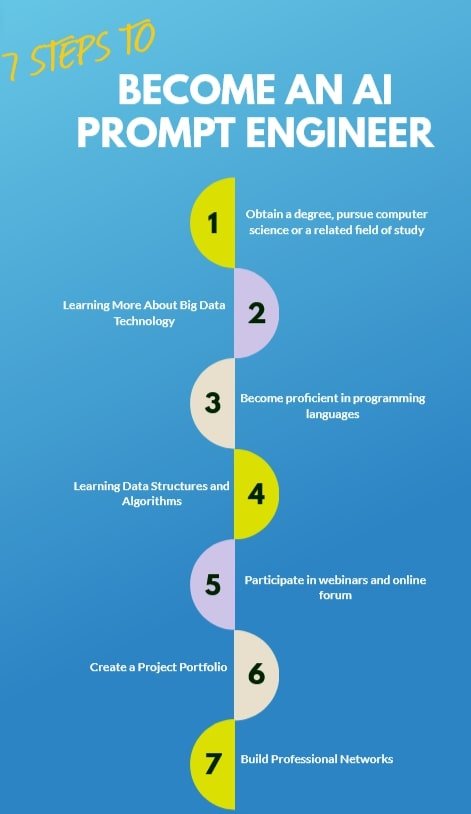Prompt engineering’s area of expertise is the design and implementation of software systems capable of processing massive amounts of data in real time.
Along with the demand for big data analytics, the demand for talented rapid engineers is rising. We’ll detail a step-by-step procedure for how to become an AI prompt engineer in this piece, together with relevant information and success tips.
Big data is being used by businesses to guide choices more and more, which has led to an increase in the demand for qualified prompt engineers.
Prompt engineering involves the creation and implementation of software systems that are capable of immediately handling and analyzing enormous amounts of data.
A successful prompt engineer possesses a blend of business knowledge, technological proficiency, and experience.
A thorough tutorial on how to become an AI prompt engineer will be covered in this article. Let us get into the article, we grab more info about prompt engineers.
Table of Contents
Prompt Engineer- What is it?
An expert in prompt engineering creates and improves prompts for AI systems, particularly those built on natural language processing. They ensure that the system produces accurate, pertinent, and valuable output by optimizing the input (prompt) provided to an AI.
They are skilled at bridging the gap between humans and robots because they comprehend the subtleties of AI systems and human language.
What is the Major Role of a Prompt Engineer?
Engineers are prompted by AI to complete a range of activities, such as:
- For AI applications like chatbots, virtual assistants, and content-generation tools
- Examining how AI systems work and enhancing prompts to increase precision and effectiveness
- Working with multidisciplinary teams to create and improve AI-driven products and services, including data scientists, software developers, and UX designers
- Keeping up with AI research developments and incorporating new methods to enhance prompt engineering processes
Training to work with AI systems allows students to not only have a big impact on the world but also provides opportunities to rich professions as prompt engineers.
Prompt engineers will be essential in determining how organizations and people use the power of these cutting-edge technologies as the field of artificial intelligence develops.
AI experts will be crucial in bringing about positive change in a variety of industries, whether it’s advancing cybersecurity, revolutionizing education, or improving healthcare.
No Need for Coding Knowledge
A prompt engineer need not be proficient at coding but having a solid comprehension of programming languages and AI frameworks can be helpful.
Because this field focuses on the linguistic and cognitive elements of AI, prompt engineers can have a variety of educational backgrounds, including linguistics, cognitive psychology, and communication.
These experts can flourish in their positions by making use of their knowledge of human language, communication, and problem-solving, which enables them to create powerful prompts without having to write code.
The Prompt Engineers’ Earning Prospects
The demand for knowledgeable prompt engineers is steadily increasing as AI continues to change numerous industries. These experts’ pay is based on their level of expertise, where they work, and the industry they work in.
However, entry-level prompt engineers can anticipate earning between $70,000 and $90,000 annually, while seasoned professionals can command salaries of more than $120,000. According to recent sources, an adept “AI whisperer” can command as much as $335,000.
An education in AI is a wise investment for prospective university students looking to the future labor market. In the upcoming years, there will be an exponential increase in the need for skilled AI professionals, and the function of prompt engineers will also expand significantly.
Prompt engineers’ knowledge will be crucial as businesses start using AI systems to automate procedures and make data-driven decisions.
7 Steps To Become an Successful AI Prompt Engineer

Step 1: To obtain a degree, pursue computer science or a related field of study.
Being a rapid engineer requires having a strong foundation in computer science. With a degree in computer science, software engineering, or a related field, you will be equipped with the skills and knowledge necessary to succeed in this field.
According to the Bureau of Labour Statistics (BLS), employment in computer and information technology was predicted to grow by 11% between 2019 and 2029, with the median annual wage for these positions reaching US$91,250 in May 2020.
Programs leading to a degree in computer science frequently cover topics including programming, algorithms, data structures, computer architecture, and operating systems.
These courses give students a solid foundation in the technical knowledge they need to start working as engineers right away.
Additionally, several universities offer specialized big data analytics courses that could give students hands-on experience with the technology and techniques used in the industry.
Step 2: Learning More about Big Data Technology
For success in rapid engineering, one must become knowledgeable in big data technologies like Apache Kafka, Apache Spark, and Hadoop. It is common practice to employ these technologies to immediately process and analyze enormous amounts of data.
According to a recent Indeed report, the average yearly salary for a big data engineer is US$132,257.
To gain knowledge of these technologies, you can consider taking online courses, participating in hackathons, or working on open-source projects. Additionally, some companies provide entry-level positions or internships that allow employees to use big data technology.
Step 3: Become proficient in programming languages
As prompt engineers, you’ll work with several different programming languages, such as Java, Python, and C++. You need to become fluent in these languages if you want to succeed in this field.
The TIOBE Index, which gauges the popularity of programming languages, places Java, Python, and C++ among the most common programming languages in use today.
To become proficient in these languages, you can consider signing up for online courses, studying programming guides, or competing in coding challenges. Working on your own projects or contributing to open-source projects might help you hone your programming skills.
Step 4: Learning Data Structures and Algorithms
Data structures and algorithms are the fundamental building blocks of computer science and power engineering.
If you have a firm grasp of data structures like arrays, linked lists, and trees as well as algorithms such as sorting and searching, you will be able to handle and analyze large amounts of data with effectiveness.
According to Glassdoor, an algorithmic-savvy software engineer makes an average salary of US$107,000.
To grasp data structures and algorithms, you can consider reading textbooks, doing coding exercises, or taking online courses.
Additionally, some academic institutions provide specialized courses in algorithms and data structures, which could provide students with in-depth knowledge and real-world experience.
Step 5: Participate in webinars and online forums
If you want to stay current with advances in prompt engineering, it’s essential to participate in online communities and attend conferences. These events give attendees the chance to network with other professionals while hearing from subject-matter experts.
A Stack Overflow study found that one of the most common ways for developers to keep up with cutting-edge technology is via attending conferences.
Joining online communities like forums or social media groups is one approach to pick up knowledge from other subject experts.
Reading industry blogs or following well-known thought leaders on social media are other ways to stay up to date on the most recent trends and technological breakthroughs in timely engineering.
Step 6: Create a Project Portfolio
To prove your skills and understanding as a prompt engineer, it’s essential to build a portfolio of projects. These jobs could be labor for clients or employers, independent initiatives, or contributions to open-source software.
A strong portfolio can demonstrate your technical knowledge, originality, and problem-solving skills to potential employers.
Selecting projects for your portfolio that showcase your talents and interests is essential. Incorporate organization and aesthetic appeal into your portfolio. To exhibit your works, think about using websites like GitHub.
Step 7: Build Professional Networks
The creation of a professional network can be advantageous for any industry, including fast engineering. By networking, one can meet potential employers, learn from subject-matter experts, and stay up to date on market trends.
To build your professional network, you can consider becoming a member of organizations like the Association for Computing Machinery (ACM) or the Institute of Electrical and Electronics Engineers (IEEE), participating in industry gatherings, or posting on online discussion boards.
Effect on the Future of AI
The future of AI will be largely shaped by prompt engineers. The demand for prompt engineers to optimize and hone these systems will only increase as businesses depend more and more on AI systems for decision-making, communication, and content creation.
Prompt engineers help to create more effective, user-friendly, and dependable AI-driven products by bridging the gap between human language and AI. This eventually changes how we engage with technology and transforms many facets of our life.
How Essential is Prompt Engineering?
The performance and accuracy of AI models can be enhanced through prompt engineering. Prompt engineering, which enables developers to find and fix any problem that may appear during the training of the model, allows for a better understanding of the shortcomings of AI models.
A model’s overall performance can be improved via quick engineering, which can turn straightforward inputs into distinctive outputs.
Prompt engineering can maximize the use of the data by choosing and arranging it to maximize its usefulness in training the model in situations when data availability is constrained, for as in medical imaging.
Furthermore, timely engineering is essential to guaranteeing that software applications live up to user expectations by responding promptly to user input, resulting in a great user experience.
Thus, a key component of AI is fast engineering, which ensures that project deadlines are met and that software applications are produced and deployed on schedule, resulting in project success.
Boost Your Career with Prompt Engineering
A career in prompt engineering is one that is rapidly expanding and offers interesting chances for those with a strong background in natural language processing and creative imagination.
The need for professional prompt engineers who can create efficient prompts and improve their outputs is anticipated to increase as AI and NLP technologies become more prevalent across a variety of businesses.
Engineers in this sector must be knowledgeable about the task or application they are working on, have a solid grasp of the language model they are employing, and be able to provide prompts that provide the essential context to produce precise and diverse outputs.
There will be a greater demand for accountability and transparency in this sector as businesses leverage language models to develop user-friendly solutions, which will raise the value of experienced prompt engineers.
Prompt engineering is expected to be one of the top profession choices in the future as a result of the development of AI and ML.
Modern tools like ChatGPT are leading the way in enhancing AI as we approach a new era in technology.
The potential for further advancement in AI is limitless, and there is a clear passion for it. Prompt engineering is the secret to riding the wave of advancement in the field of AI for those who wish to be a part of it.
What abilities are Needed to Become a Prompt Engineer?
To pursue prompt engineering as a career option, you’ll need the following abilities:
- Computer science or a closely related field with a bachelor’s degree.
- Excellent writing and communication abilities.
- Understanding of the capabilities and limitations of AI models.
- Knowledge of natural language processing would be advantageous.
Explain about career profile
Software design, development, testing, debugging, maintenance, and updating are the responsibilities of a prompt engineer. They collaborate closely with programmers to make sure the software is effective and quick.
Finding and fixing AI systems’ weaknesses and coming up with plans to fully use them are crucial aspects of their work. To provide exceptional results, they must have a comprehensive understanding of the technology.
Top-notch language model replies are made possible by prompt engineering. Well-written prompts that prevent off-topic, inconsistent, or objectionable output are essential to a language model’s effectiveness.
For modest inputs to provide high-quality outcomes, prompt engineers must push the boundaries of AI technology and create sophisticated strategies.
By recognizing the limitations and possibilities of AI systems and creating original techniques to provide high-quality results, prompt engineers are accountable for creating extraordinary language model answers.
Average Salary of Prompt Engineer in the United States
A relatively new and quickly expanding area of machine learning is prompt engineering. Because of this, it is difficult to determine the compensation range for prompt engineers in the USA.
However, recent job advertisements by the AI research firms Anthropic and OpenAI offer information on the pay range for prompt engineers.
A prompt engineer and prompt librarian position were just posted by Anthropic, with a basic salary range of $250,000 to $335,000.
Similar to this, OpenAI is employing hundreds of engineers to enhance the dependability and efficiency of their ChatGPT machine learning platform.
Salaries for research and engineering positions in applied AI at the company can approach $370,000. While these job ads provide a peek at the possible earnings for prompt engineers.
It’s crucial to keep in mind that the area is still developing and that actual salaries may vary according to experience, location, and sector. In general, rapid engineering is proven to be a very profitable industry with substantial development potential in the years to come.
Wrapping Up
As a result, fast engineering is a critical component of AI development that helps to guarantee precision, efficacy, and user happiness. The employment prospects for quick engineers are bright because of the rising demand for AI and NLP technology across numerous sectors.
To succeed in this sector, you’ll need a mix of technical abilities, familiarity with AI models and NLP, and a creative attitude. Prominent organizations offer generous compensation packages, making the earning potential for quick engineers quite valuable.
Prompt engineering will surely be essential to unlocking the potential of AI technology as we continue to push its boundaries in order to make improvements and novel solutions across a variety of industries.
Frequently Asked Questions
What is the future of prompt engineering?
Though the direction of prompt engineering is difficult to forecast, it is plausible to assume that it will develop along the well-known IT industry maturity pattern of diversity, specialization, and standardization.
What are the roles and tasks of a prompt engineer?
A prompt engineer creates and improves prompts, works with teams from the content, product, and data departments, keeps track of prompt performance, optimizes the AI prompt production process, and keeps up with AI developments.
What are the soft skills required to become a prompt engineer?
As technology advances, engineers will need to have a variety of soft skills, including strong analytical and problem-solving abilities as well as the capacity to work well in cross-functional teams.
Although formal schooling and certification are still not very common, many businesses may still look for some sort of traditional academic education, like a BS in Computer Science, Engineering, or a closely similar profession.



